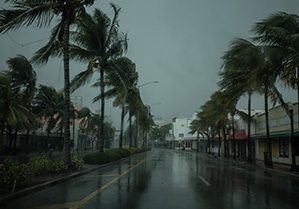Hurricanes are capable of producing winds in excess of 155 mph and causing catastrophic damage to coastlines and several hundred miles inland. Additionally, hurricanes can also lead to storm surges along the coast and cause extensive damage from heavy rainfall.
Before a Hurricane
To prepare for a hurricane, take the following measures:
- Charge any device that provides light. Laptops, tablets, cameras, video cameras, and old phones. Old cell phones can still used for dialing 911. Charge external battery backups. (Glow sticks also provide light for a few hours. Stand them upright in a glass or jar to make a lantern.)
- Wash all trash cans, big and small, and fill with water for flushing toilets. Line outdoor trash cans with trash bags, fill with water and store in the garage. Add bleach to sterilize.
- Fill every tub and sink with water. Cover sinks with Saran Wrap to keep it from collecting dust. Fill washing machine and leave lid up to store water.
- Fill old empty water bottles and other containers with water and keep near sinks for washing hands.
- Fill every Tupperware with water and store in freezer. These will help keep food cold longer and serve as a back up water supply.
- Fill drinking cups with water and cover with Saran Wrap. Store as many as possible in fridge. The rest you can store on the counter and use first before any water bottles are opened. Ice is impossible to find after the storm.
- Reserve fridge space for storing tap water and keep the sealed water bottles on the counter.
- Cook any meats in advance and other perishable foods. You can freeze cooked food. Hard boil eggs for snacks for first day without power.
- Be well hydrated before the storm hits and avoid salty foods that make you dehydrated.
- Wash all dirty clothes and bed sheets. Anything dirty will smell without the A/C, you may need the items, and with no A/C, you’ll be sweating a lot. You’re going to want clean sheets.
- Toss out any expiring food, clean cat litter boxes, empty all trash cans in the house, including bathrooms. Remove anything that will cause an odor when the A/C is off. If you don’t have a trash day pickup before the storm, find a dumpster.
- Bring in any yard decor, secure anything that will fly around, secure gates, bring in hoses, potted plants, etc. Bring in patio furniture and grills.
- Clean your environment so you have clear, easy escape routes. Even if that means temporarily moving furniture to one area.
- Scrub all bathrooms so you are starting with a clean odor free environment. Store water filled trash cans next to each toilet for flushing.
- Place everything you own that is important and necessary in a backpack or small file box that is easy to grab. Include your wallet with ID, phone, hand sanitizer, snacks, etc. Get plastic sleeves for important documents.
- Make sure you have cash on hand.
- Stock up on pet food and fill up bowls of water for pets.
- Refill any medications. Most insurance companies allow for 2 emergency refills per year.
- Fill your propane tanks. You can heat soup cans, boil water, make coffee, and other stuff besides just grilling meat. Get an extra, if possible.
- Drop your A/C in advance and lower temperatures in your fridges.
- Gather all candles, flashlights, lighters, matches, batteries, and other items and keep them accessible.
- Clean all counters in advance. Start with a clean surface. Buy Clorox Wipes for cleaning when there is no power. Mop your floors and vacuum. If power is out for 10 days, you’ll have to live in the mess you started with.
- Pick your emergency safe place such as a closet under the stairs. Store the items you’ll need in that location for the brunt of the storm. Make a hand fan for when the power is out.
- Shower just before the storm is scheduled to hit.
- Keep baby wipes next to each toilet. Don’t flush them. It’s not the time to risk clogging your toilet!
- Run your dishwasher, don’t risk having dirty smelly dishes and you need every container for water! Remember you’ll need clean water for brushing your teeth, washing yourself, and cleaning your hands.
- Put a small suitcase in your car in case you decide to evacuate. Also put at least one jug of water in your car. It will still be there if you don’t evacuate! You don’t need to store all water in the house. Remember to pack for pets as well.
- Check on all family members, set up emergency back up plans, and check on elderly neighbors.
- Remember, pets are family too. Take them with you!
- Before the storm, unplug all electronics. There will be power surges during and after the storm.
- Gas up your car and have a spare gas container for your generator or your car when you run out.
- Use plastic cups and paper plates. You need water to wash dishes….
- Also if you run out of water tap your hot water heater it can have up to 30 gallons stored in there
- Put water in balloons and store in freezer.
If you can, take a video of your house and contents. Walk room to room, open cabinets/drawers and closets. This will help if you need to make a claim later. It will show proof of items and help you list all the items (help your memory, so you don’t forget anything). We highly recommend!!!
Finally, anything that you want to try and preserve, but you can’t take with you—place it in a plastic bin and put in your dishwasher, lock the door—this should make it water tight in case of any water intrusion into your home. But of course, take all the important/irreplaceable items.
After a Hurricane
- Continue listening to the radio or the local news for the latest updates.
- Stay alert for extended rainfall and subsequent flooding, even after the hurricane or tropical storm has ended.
- If you have become separated from your family, use your family communications plan or contact the American Red Cross at 1-800-RED-CROSS/1-800-733-2767
- The American Red Cross also maintains a database to help you find family. Contact the local American Red Cross chapter where you are staying for information. Do not contact the chapter in the disaster area.
- If you evacuated, return home only when officials say it is safe.
- For those who have longer-term housing needs, the Federal Emergency Management Agency (FEMA) offers several types of assistance, including services and grants to help people repair their homes and find replacement housing. Apply for assistance or search for information about housing rental resources.
- Drive only if necessary and avoid flooded roads and washed-out bridges. Stay off the streets. If you must go out, watch for fallen objects including downed electrical wires, weakened walls, bridges, roads and sidewalks.
- Keep away from loose or dangling power lines and report them immediately to the power company.
- Walk carefully around the outside your home and check for loose power lines, gas leaks and structural damage before entering.
- Stay out of any building if you smell gas, or if floodwater remains around the building or your home was damaged by fire and the authorities have not declared it safe.
- Inspect your home for damage. Take pictures of damage, both of the building and its contents, for insurance purposes. If you have any doubts about safety, have your residence inspected by a qualified building inspector or structural engineer before entering.
- Use battery-powered flashlights in the dark. Do not use candles. Keep in mind that the flashlight should be turned on outside before entering, as the battery may produce a spark that could ignite leaking gas, if present.
- Watch your pets closely and keep them under your direct control. Watch out for wild animals, especially poisonous snakes. Use a stick to poke through debris.
- Avoid drinking or preparing food with tap water until you are sure it’s not contaminated.
- Check refrigerated food for spoilage. If in doubt, throw it out.
- Wear protective clothing and be cautious when cleaning up to avoid injury.
- Use the telephone only for emergency calls.
- Never use a generator inside homes, garages, crawlspaces, sheds or similar areas, even when using fans or opening doors and windows for ventilation. Deadly levels of carbon monoxide can quickly build up in these areas and can linger for hours, even after the generator has shut off.
The Horton Group is committed to helping you and your loved ones stay safe when disaster strikes. For further personal risk management guidance, contact us today.
Material posted on this website is for informational purposes only and does not constitute a legal opinion or medical advice. Contact your legal representative or medical professional for information specific to your legal or medical needs.




